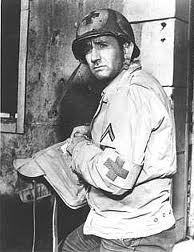Friend Grief and Medics
Apr 01, 2014 by Victoria Noe, in corpsmen
, Friend Grief
, Grief
, grieving
, medics
, military
, survivor guilt
 |
| Conlan Carter as Doc on "Combat!" |
Imagine you work in an emergency room. You’re an orderly, maybe – no rank in the pecking order. You might be the only one there to help, or you might have help, but not from a doctor or nurse – there aren’t any. It’s all on you.
Every day – in bursts of activity that last for hours – your workplace is filled with patients. They’re screaming and panicky or very, very still. Some are missing legs or eyes; others have horrific head wounds. The floors are covered with blood and bandages and random pieces of flesh.
You’re trying to be in three places at once; responding to whichever patient you think can be stabilized and moved up to surgery. The people you’re working on are barely out of high school. And you know every one of them.
When we think of medics, we generally think of movies and TV shows. They were (usually) guys who were referred to as “Doc”, even though they weren’t doctors. They were often older than the squads they accompanied. Most of their duties consisted of tending to non-life-threatening injuries.
As I researched my next book, Friend Grief and the Military: Band of Friends, I found amazing stories about medics. Men and women on the front lines, their role has evolved, just as the nature of war has evolved.
I was surprised to learn the following:
Medics are allowed to carry and use weapons in self-defense or in the defense of their patients.
US Navy medical corpsmen have earned 22 Medals of Honor, the highest honor for any member of the military.
One of the Marines raising the flag on Iwo Jima was a medic.
We tend to not think of medical professionals as our friends in civilian life. But the uniqueness of war makes everyone dependent on one another: living in close quarters, traveling together, eating together, and sometimes dying together.
They are in a vulnerable position, not being combatants. They rely on their unit to protect them. Trust must be absolute.
The grief they feel when a soldier in their unit dies can be complicated by guilt at being unable to save their friend, who may have died protecting them. They must also be able to assess why someone died, and learn something from it to use in the future.
I read one book by a doctor who spoke with great gentleness about the medics who served with him. They’re the same age as the guys they’re taking care of – 18, 19, 20 – or maybe a decade younger. They are working against the clock – and battle conditions – to save limbs and organs and lives of the friends who minutes earlier were protecting them. And every day they see things that would bring a civilian emergency room physician to his or her knees.
And they, too, like the others in their unit, rarely have the luxury to grieve immediately. That must wait for later.
You’ll learn more about them and their incredible bravery in my book. But next time you watch a movie or TV show set on the battlefield, think about those medics. Their job was and is a hell of a lot tougher than it looks.

